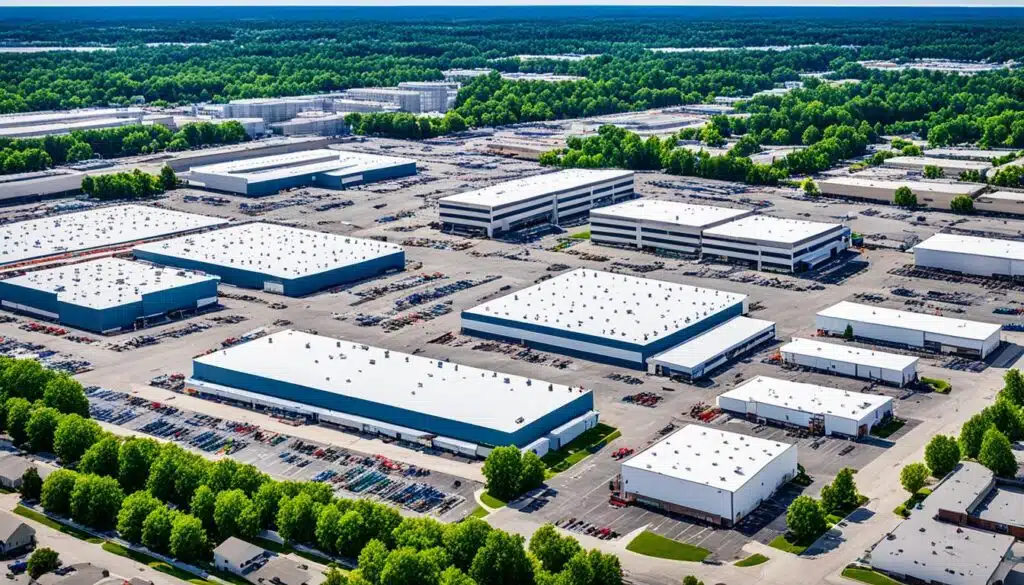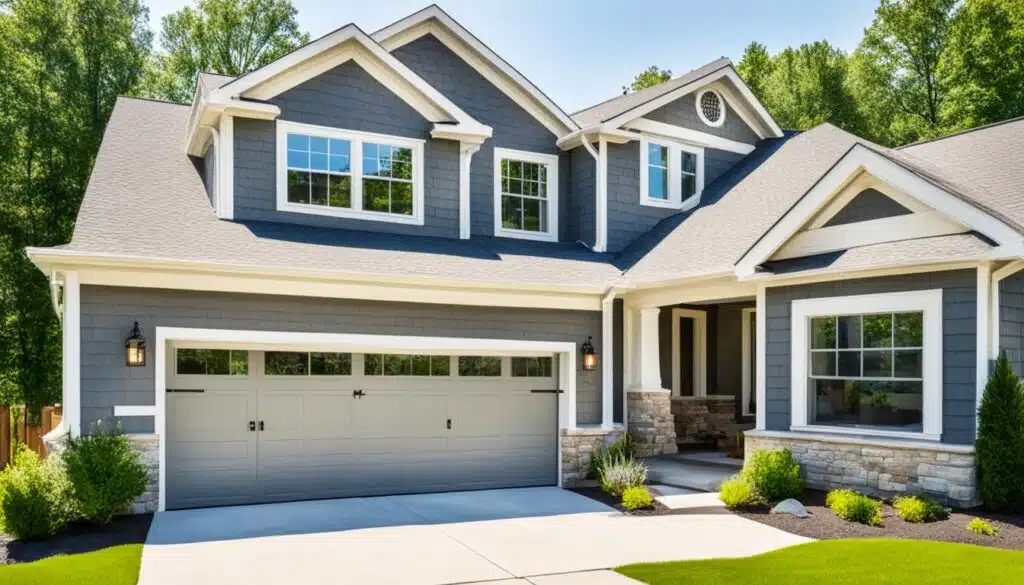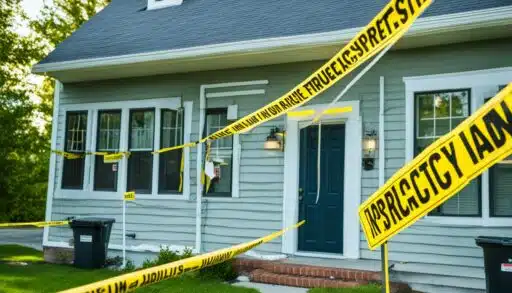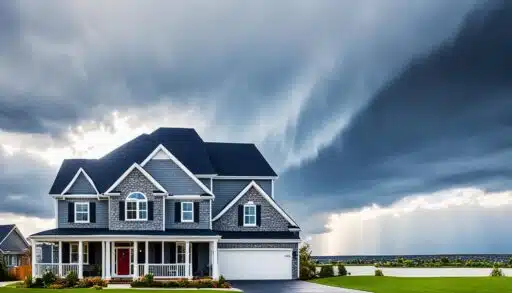Property insurance is a critical consideration for businesses of all sizes. Whether you own a small startup or manage a large corporation, protecting your assets is essential. Property insurance provides coverage for physical damage to buildings and structures, as well as liabilities and financial losses that may arise from unexpected events.
When it comes to property insurance options for businesses, it’s important to understand the different types available. Commercial property insurance is designed for larger properties, while business property insurance focuses on protecting the specific assets owned by a business. Small business owners, in particular, need to carefully consider their insurance options to ensure adequate coverage and protection for their assets.
Key Takeaways:
- Property insurance is crucial for businesses to protect their physical assets.
- Commercial property insurance is suitable for larger properties, while business property insurance focuses on specific business assets.
- Small businesses should carefully consider their insurance options to ensure adequate coverage.
- Property insurance provides protection against physical damage, liabilities, and financial losses.
- Choose the most suitable type of property insurance to protect your assets and mitigate risks.
Understanding Property Insurance Coverage
When it comes to protecting your business, property insurance coverage plays a vital role. This type of insurance provides comprehensive protection for the physical structure of your business property, including buildings, garages, and warehouses. It goes beyond that, extending coverage to the contents and assets within your premises, such as inventory, equipment, and furniture.
Two common types of property insurance coverage are commercial property coverage and business property coverage. Commercial property coverage offers a broader scope of protection for commercial properties, while business property coverage focuses specifically on safeguarding the assets owned by your business. The specific coverage options may vary based on the insurance company and policy you choose.
Having property insurance coverage helps ensure that your business is protected against unforeseen events that could cause damage or loss of your valuable assets. It provides financial security and peace of mind, enabling you to focus on running your business without unnecessary worry.
Protecting Your Business Assets
Property insurance coverage safeguards the physical structure of your business property, including buildings and attached structures. It also covers the interior assets and contents, such as inventory, equipment, and furniture. In the event of a covered loss, property insurance can help cover repair or replacement costs, ensuring minimal disruption to your business operations.
“Property insurance coverage provides financial security and peace of mind, enabling you to focus on running your business without unnecessary worry.”
Whether you own a commercial property or a small business, having proper property insurance coverage is crucial. It protects your assets and investments, shielding you from significant financial losses that could undermine your business’s stability.
| Key Coverage Aspects | Description |
|---|---|
| Physical Structure Coverage | Protection against damage or loss to the buildings and attached structures of your business property. |
| Content and Asset Coverage | Protection for the inventory, equipment, furniture, and other assets housed within your business property. |
| Comprehensive Coverage Options | Various coverage options are available, depending on the insurer and policy chosen, to suit your specific business needs and risks. |
By understanding the different aspects of property insurance coverage, you can make informed decisions when selecting the right policy for your business. It’s important to review the coverage options offered by different insurance providers and consult with an insurance professional to ensure you have the appropriate level of protection.
Types of Property Insurance Policies
When it comes to protecting your business assets, there are different types of property insurance policies available. These policies are designed to provide coverage and financial protection in case of property damage, liability claims, and even interruption of business operations. Understanding the various options can help you choose the most suitable policy for your business needs.
Commercial Property Insurance Policies
Commercial property insurance policies are specifically designed for larger commercial buildings. These policies offer broader coverage and are ideal for businesses with extensive properties. They provide protection for the physical structure of the building, as well as any attached structures such as garages or warehouses. Additionally, commercial property insurance covers the contents and assets within the premises, including inventory, equipment, and furniture.
Small Business Insurance Options
For small business owners, there are specific insurance options available that cater to their unique needs. These small business insurance policies provide coverage for property damage, liability claims, and even interruption of business operations. Whether you own a retail store, a restaurant, or a small office space, these policies can be tailored to your business requirements. It is essential to assess your specific needs and choose the most suitable type of policy to protect your assets.
By selecting the right property insurance policy, you can safeguard your business assets and ensure financial security. It’s crucial to review your options carefully and consider the specific needs of your business before making a decision.
Key Coverage Options for Property Insurance
In order to safeguard their business assets, it is essential for businesses to understand the key coverage options offered by property insurance. These options provide protection against various risks and liabilities, ensuring that businesses can recover and continue operations in the face of adversity.
1. Property Damage Coverage:
Property damage coverage is designed to protect businesses from physical damage to their buildings and contents caused by covered perils like fire, theft, and natural disasters. It provides financial reimbursement for repairing or replacing the damaged property.
“Property damage coverage shields businesses from the financial burden of repairing or replacing their assets.”
2. Liability Coverage:
Liability coverage plays a crucial role in protecting businesses from legal claims and expenses arising from injuries or property damage suffered by others on their premises. It provides coverage for legal defense costs, settlements, and judgments.
“Liability coverage safeguards businesses from the financial implications of legal claims.”
3. Business Interruption Insurance:
Business interruption insurance provides coverage for lost income and additional expenses when a covered incident or disaster forces a temporary halt in business operations. It helps offset the financial impact of such disruptions and aids in business recovery.
“Business interruption insurance ensures financial stability during temporary business disruptions.”
By carefully considering these coverage options, businesses can tailor their property insurance policies to best suit their specific needs and mitigate potential risks.

Additional Coverages for Comprehensive Protection
In addition to the standard coverage options, businesses have the opportunity to enhance their insurance policy’s comprehensiveness by opting for additional coverages. These optional coverages provide businesses with more comprehensive protection against specific risks and perils, filling the gaps that may exist in standard policies. Here are some of the additional coverages that businesses can consider:
- **Vandalism Coverage:** This coverage protects businesses against damages caused by acts of vandalism, such as graffiti, destruction of property, or malicious acts.
- **Building Code Upgrade Coverage:** This coverage helps businesses cover the costs associated with bringing a building up to current code standards in the event of damage or reconstruction.
- **Earthquake Coverage:** Businesses operating in earthquake-prone areas can opt for earthquake coverage to protect their properties and assets in the event of seismic activity.
- **Flood Insurance:** Flood insurance provides coverage for businesses located in flood zones, safeguarding against damages caused by rising water levels.
- **Sewer Backup Coverage:** This coverage protects businesses from damages and financial losses resulting from sewer backups, which can cause significant property damage and disruption of operations.
By choosing these additional coverages, businesses can tailor their insurance policies to their specific needs, ensuring comprehensive protection against the unique risks they may face.

Understanding the Differences: Landlord Insurance, Homeowners Insurance, and Business Insurance
When it comes to insurance, businesses need to be aware of the distinctions between landlord insurance, homeowners insurance, and business insurance. Each type of insurance serves specific purposes and is tailored to unique circumstances.
Landlord Insurance is designed to protect rental properties. It provides coverage for the physical structure, liability, and loss of rental income. Landlords can rely on this insurance to safeguard their investment and mitigate risks associated with renting out properties.
Homeowners Insurance is intended for owner-occupied properties. This insurance covers the structure of the home, personal belongings, and liability. Homeowners can have peace of mind knowing their property and possessions are protected from various risks.
Business Insurance is specifically designed to protect businesses and their assets. This includes property insurance, which provides coverage for property damage, liability, and other related risks. Business owners can rely on this insurance to ensure the continuity of their operations and safeguard their valuable assets.
To better understand the differences, refer to the table below:
| Type of Insurance | Coverage | Target Audience |
|---|---|---|
| Landlord Insurance | – Physical structure coverage – Liability coverage – Loss of rental income coverage |
Landlords with rental properties |
| Homeowners Insurance | – Structure coverage – Personal belongings coverage – Liability coverage |
Homeowners |
| Business Insurance | – Property damage coverage – Liability coverage – Risk-specific coverage |
Business owners |

Understanding the differences between these insurance options is crucial for businesses. By selecting the right insurance coverage, businesses can protect their assets, mitigate risks, and ensure the continuity of their operations.
Factors Affecting Property Insurance Costs
The cost of property insurance for businesses can vary based on several factors. These factors include:
- Location: The geographical location of the property can impact insurance costs. Areas prone to natural disasters or with high crime rates may have higher insurance premiums.
- Age and Condition: Older properties or properties in poor condition may be considered higher risks, leading to higher insurance costs.
- Coverage Limits and Deductibles: The coverage limits chosen and the amount of deductible selected can affect insurance costs. Higher coverage limits and lower deductibles generally result in higher premiums.
- Type of Business: Different types of businesses face varying risks, which can impact insurance costs. For example, a manufacturing business may have higher property insurance costs compared to a consulting firm.
In addition, commercial property insurance costs may also depend on the industry and specific risks associated with the business. Some industries carry higher inherent risks, such as construction or healthcare, which can lead to higher insurance premiums.
To find the most cost-effective property insurance option, businesses should consider these factors and obtain insurance quotes from multiple providers. Comparing quotes and evaluating coverage options can help businesses make informed decisions and find insurance that suits their needs and budget.

| Factors Affecting Property Insurance Costs | Impact on Insurance Costs |
|---|---|
| Location | Higher-risk areas can lead to higher premiums. |
| Age and Condition | Older or poorly maintained properties may result in higher costs. |
| Coverage Limits and Deductibles | Higher coverage limits and lower deductibles usually mean higher premiums. |
| Type of Business | Different industries face varying risks, impacting insurance costs. |
| Industry and Specific Risks | Some industries carry higher inherent risks, resulting in higher premiums. |
Importance of Property Insurance for Businesses
Property insurance plays a vital role in safeguarding businesses and ensuring their long-term viability. With the ability to protect valuable assets, property insurance serves as a financial safety net in the event of unforeseen circumstances. By providing coverage for property damage, liability claims, and business interruption, property insurance shields businesses from substantial financial losses that could otherwise lead to closure.
One of the primary benefits of property insurance is its ability to safeguard a business’s physical assets. Whether it’s a commercial building, equipment, inventory, or furniture, property insurance provides financial coverage in case of damage or loss due to covered perils such as fire, theft, or natural disasters. This ensures that businesses can recover and rebuild, minimizing the impact of such incidents on their operations.
Moreover, property insurance protects businesses from liability claims. In the event that someone gets injured on the business premises, property insurance covers the associated legal expenses and potential settlements. This coverage mitigates the risk of substantial financial burdens and helps maintain the business’s reputation.
“Without proper property insurance, businesses may face significant financial losses and potential closure.”
Additionally, property insurance includes coverage for business interruption. If a covered loss forces a business to temporarily halt its operations, property insurance provides compensation for lost income and the additional expenses incurred during the interruption. This ensures that businesses can continue to meet their financial obligations and maintain their position in the market until normal operations resume.
Also Read:- A Comprehensive Guide On How To File A Home Insurance Claim With Confidence
Investing in comprehensive property insurance is crucial for businesses of all sizes and industries. By doing so, businesses can protect their assets, ensure business continuity, and mitigate financial risks. Without proper insurance coverage, businesses face the possibility of significant setbacks and potential closure.

| Benefits of Property Insurance | Examples |
|---|---|
| Protection of physical assets | Insurance coverage for commercial buildings, equipment, and inventory. |
| Liability coverage | Financial protection against legal claims and expenses resulting from injuries on business premises. |
| Business interruption coverage | Compensation for lost income and additional expenses during temporary business closures. |
Conclusion
Property insurance plays a crucial role in protecting businesses and their valuable assets. It provides coverage for physical damage to buildings and structures, as well as financial losses and liabilities. By understanding the different property insurance options available, businesses can make informed decisions and select the most appropriate coverage for their specific needs.
Investing in property insurance is essential for safeguarding assets and ensuring business continuity. In the event of a covered loss, businesses can recover and resume operations without facing significant financial setbacks. The comprehensive protection offered by property insurance solutions enables businesses to mitigate risks and focus on their core operations.
Businesses should prioritize property insurance as part of their overall risk management strategy. Whether it’s commercial property insurance for larger establishments or tailored policies for small businesses, having the right coverage in place is crucial. With the right property insurance solutions, businesses can protect their assets, mitigate financial risks, and secure long-term success.
FAQs
Q: What is property insurance for businesses?
A: Property insurance covers business property such as buildings, equipment, inventory, and other assets from damage or loss due to events like fire, theft, or natural disasters.
Q: Why do businesses need commercial property insurance?
A: Businesses need commercial property insurance to protect their physical assets and investments from various risks, ensuring financial stability in the event of property damage or loss.
Q: How does commercial property insurance help protect my business?
A: Commercial property insurance helps protect your business by covering costs associated with damage to or loss of your business property, including repairs, replacements, and potential interruption of operations.
Q: What does business personal property insurance cover?
A: Business personal property insurance typically covers items such as furniture, equipment, inventory, and other belongings owned by the business in case of damage or loss.
Q: What is the difference between general liability insurance and commercial property insurance?
A: General liability insurance primarily covers claims of bodily injury or property damage caused by your business operations, while commercial property insurance focuses on protecting the physical assets of your business.
Q: How can I purchase commercial property insurance for my business?
A: You can purchase commercial property insurance through insurance agents or brokers who specialize in commercial insurance products. They can help assess your needs and find the right coverage for your business.
Q: What types of commercial property insurance are available for small businesses?
A: Small businesses can choose from various types of commercial property insurance, including basic property coverage, business interruption insurance, equipment breakdown coverage, and more, tailored to their specific needs.




